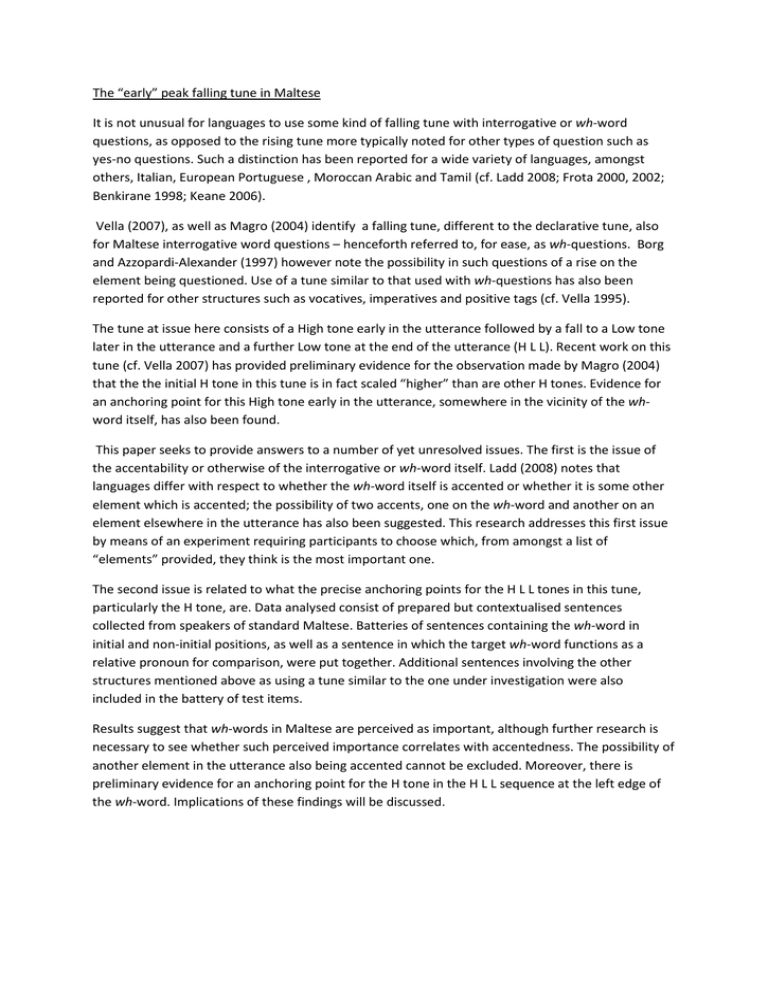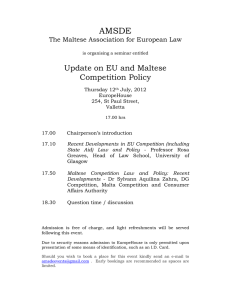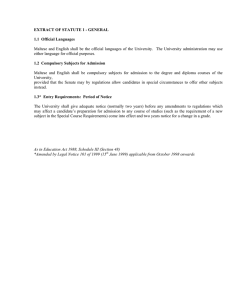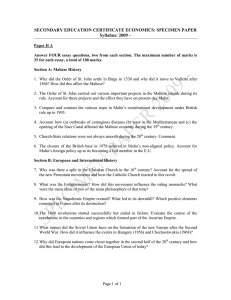The “early” peak falling tune in Maltese wh
advertisement

The “early” peak falling tune in Maltese It is not unusual for languages to use some kind of falling tune with interrogative or wh-word questions, as opposed to the rising tune more typically noted for other types of question such as yes-no questions. Such a distinction has been reported for a wide variety of languages, amongst others, Italian, European Portuguese , Moroccan Arabic and Tamil (cf. Ladd 2008; Frota 2000, 2002; Benkirane 1998; Keane 2006). Vella (2007), as well as Magro (2004) identify a falling tune, different to the declarative tune, also for Maltese interrogative word questions – henceforth referred to, for ease, as wh-questions. Borg and Azzopardi-Alexander (1997) however note the possibility in such questions of a rise on the element being questioned. Use of a tune similar to that used with wh-questions has also been reported for other structures such as vocatives, imperatives and positive tags (cf. Vella 1995). The tune at issue here consists of a High tone early in the utterance followed by a fall to a Low tone later in the utterance and a further Low tone at the end of the utterance (H L L). Recent work on this tune (cf. Vella 2007) has provided preliminary evidence for the observation made by Magro (2004) that the the initial H tone in this tune is in fact scaled “higher” than are other H tones. Evidence for an anchoring point for this High tone early in the utterance, somewhere in the vicinity of the whword itself, has also been found. This paper seeks to provide answers to a number of yet unresolved issues. The first is the issue of the accentability or otherwise of the interrogative or wh-word itself. Ladd (2008) notes that languages differ with respect to whether the wh-word itself is accented or whether it is some other element which is accented; the possibility of two accents, one on the wh-word and another on an element elsewhere in the utterance has also been suggested. This research addresses this first issue by means of an experiment requiring participants to choose which, from amongst a list of “elements” provided, they think is the most important one. The second issue is related to what the precise anchoring points for the H L L tones in this tune, particularly the H tone, are. Data analysed consist of prepared but contextualised sentences collected from speakers of standard Maltese. Batteries of sentences containing the wh-word in initial and non-initial positions, as well as a sentence in which the target wh-word functions as a relative pronoun for comparison, were put together. Additional sentences involving the other structures mentioned above as using a tune similar to the one under investigation were also included in the battery of test items. Results suggest that wh-words in Maltese are perceived as important, although further research is necessary to see whether such perceived importance correlates with accentedness. The possibility of another element in the utterance also being accented cannot be excluded. Moreover, there is preliminary evidence for an anchoring point for the H tone in the H L L sequence at the left edge of the wh-word. Implications of these findings will be discussed. References Benkirane, T. 1998. Intonation in Western Arabic (Morocco). In: Hirst, D., Di Cristo, A. (eds) Intonation Systems: a survey of twenty languages. Cambridge: Cambridge University Press, 345359. Borg, A. & M. Azzopardi-Alexander. 1997. Maltese. Descriptive Grammars. London & New York: Routledge. Frota, S. 2000. Prosody and Focus in European Portuguese: phonological phrasing and intonation. New York & London: Garland Publishing Inc. Frota, S. 2002. Nuclear falls and rises in European Portuguese: a phonological analysis of declarative and question intonation. Probus 14 (1), 113-146. Keane, E. 2006. Phonetics vs. phonology in Tamil wh-questions. In: Proc. of Sp Pros Dresden. Ladd, D. R. L. 2000. Intonational Phonology. 2nd edition. Cambridge: Cambridge University Press. Magro, E-P. 2004. La chute de la mélodie dans les énoncés assertifs en maltais : finalité ou continuation? Actes des XXVes Journées d’Etude sur La Parole, Fès, Maroc, 333-336. Sutcliffe, E. F. 1936. A Grammar of the Maltese Language. Oxford: Oxford University Press. Vella, A. 1995. Prosodic Structure and Intonation in Maltese and its Influence on Maltese English. Ph.D. thesis, University of Edinburgh. Vella, A. 2007. The phonetics and phonology of wh-question intonation in Maltese. In: Proc. of ICPhS, Saarbrücken, 1285-1288.



